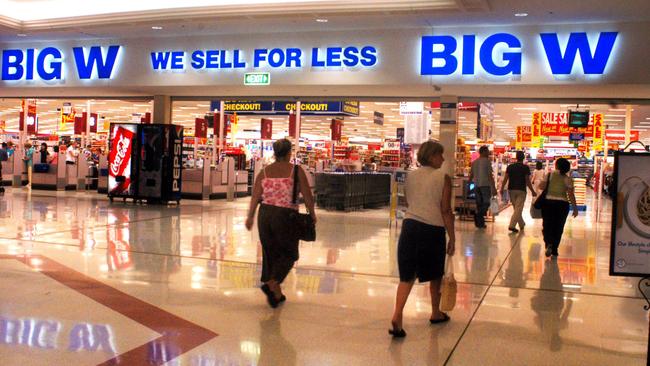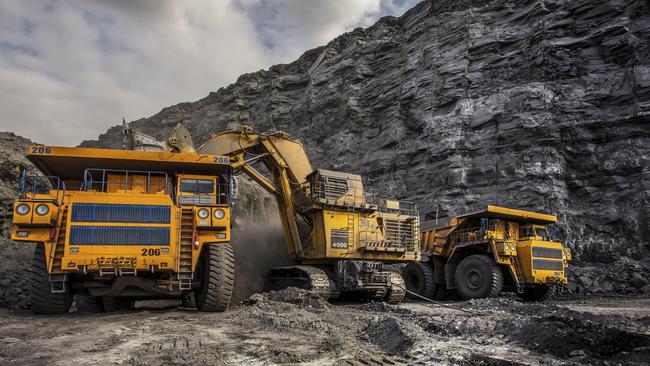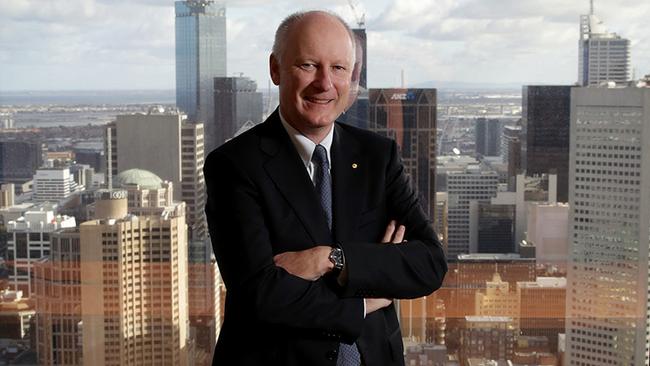Wesfarmers big end retail refocus
WESFARMERS CEO Richard Goyder has finally seemingly embraced the strategic and operational reality of the decision he took at the start of his term to splurge $20 billion buying the Coles Group, writes Terry McCrann.

Terry McCrann
Don't miss out on the headlines from Terry McCrann. Followed categories will be added to My News.
WESFARMERS CEO Richard Goyder has finally in the twilight of his career in 2016 seemingly embraced the strategic and operational reality of the decision he took in the pre-GFC exuberance at the very start of his term way back in 2007 to splurge $20 billion buying the Coles Group.
In an exquisite coincidence, on the same day, Wesfarmers’ ‘major competitor’ Woolworths also made an announcement which pointed to a similar fundamental corporate inflection point: that in its case it would return to its core operational competency.
In 2007 Wesfarmers CEO and board ‘made a decision’ to become a retailer. But bizarrely, they didn’t seem to realise it, as they spent the next decade denying the reality they had embraced. They clung instead to the group’s conglomerate history.
On Wednesday they ‘announced’ they were going to sell the group’s coal business. I put that word in quotation marks for two reasons.
First, because they didn’t actually do that. The statement ‘noted’ media speculation regarding a potential sale of part or all of the coal assets. And then it went on to state that the company was considering a “broad range of options”.
These only “included recently seeking expressions of interest from external parties who may want to acquire the coal assets.”
That points to the second reason for my quotation marks. Because a sale, not generalised waffle, is exactly what Wesfarmers should have announced: that it was embarked on selling its resources assets, no qualification, no backtracking.
Both Goyder and the Wesfarmers board should consider themselves multi-billion dollar lucky that they’ve been given a second chance by the spectacular and completely unexpected rise in the prices of both energy and especially — the majority of Wesfarmers’ coal sales — coking coal.
They should have grabbed the opportunity to sell out of coal in 2009 when China sent coal prices rocketing to stratospheric and totally unsustainable levels, when that generated a thumping $885 million in EBIT for Wesfarmers, an 82 per cent return on capital, and what could have been a very big multi-billion cheque to soak up some of the money splurged on Coles.
Or in 2012 when commodity prices were once again recovering thanks to China and Wesfarmers made $439 million EBIT in the resources division. It might have been a smaller cheque, but a big one still.
Projecting a complete failure to understand the reality they had embraced in buying Coles, the divisional earnings slide in the 2012 presentation was headed “Strength through diversified earnings.” But even in that ‘good’ year for coal, it only contributed 12 per cent to group divisional earnings.

Wesfarmers went from lack of corporate self-awareness to full-on asinine when it stuck with that heading in both the 2013 and 2014 results presentations.
No, it wasn’t getting “strength” from “diversified earnings. In both years 80 per cent or more of earnings came from retail. It had made its bed but refused to understand what it was lying in.
It wasn’t just the case that Wesfarmers had turned itself into a retailer and was engaged in the most bizarre exercise of self-denial; apart from devastating its group rate of return on shareholder capital by the decision. The delusion was playing out negatively in real-time at both the strategic and operational levels.
Yes, it belatedly sold out of insurance, but it clung to both coal and the ‘diversified conglomerate’ tag (like ‘flyover deplorables’ clung to their guns and religion, according to Barack Obama?).
True it then essentially had to as the coal price and its division’s earnings — and value — tanked. After 2012’s last burst, resources contributed 4 per cent, then 3.9 per cent, 1.3 per cent, and in the last year a $310 million loss to group EBIT.
GOYDER has now got a chance to rectify the mistake he made in 2009/2012 and to demonstrate he finally gets the consequences of his $20 billion 2007 decision. That in buying Coles, plural, he should have embarked on quitting coal, singular.
Forget the Malcolm Turnbull-like waffle of a “broad range of options,” he better emerge over the next month or so with a very big cheque.
As for Woolies, its even ‘blander’ statement — that the CEO of its
Big W division, Sally Macdonald was ‘leaving the store’ after just 10 months in the job — concealed a much bigger and indeed momentous corporate reality that paralleled the scales dropping from those Wesfarmers eyes. Or perhaps more accurately, should have concealed: that while Wesfarmers was a retailer not a conglomerate, Woolies was an even more specialised retailer: supermarkets.
In a classic case of corporate hubris and lack of self-awareness Woolies thought that just because it was good — indeed dominant — in supermarkets — it would be good at all forms of retailing. So back in 2011 it made that disastrous decision to go into hardware and home improvement.
We all know how that worked out. Some billions down the gurgler later — $4 billion? $5 billion? I haven’t done the full calculation — it discovered that the skills in screwing suppliers and selling food didn’t translate seamlessly to hardware.
But it also meant it took its eye of the main-game; and again, we know how that played out. But further, this also meant it went to sleep with Big W; and now arguably there’s no coming back.
Again I make the same comment. CEO Brad Banducci and his board better get out of Big W a lot faster than it took dithering over Masters. Unlike Goyder, they won’t be given the luxury of a second chance.

THE AGE PARROTS AND VERBALS
IT is astonishing but not exactly surprising that the economics editor of the Age could purport to parrot the following sentence from the IMF report on Australia without immediately pointing out how embarrassingly wrong it was.
“The first Turnbull budget ‘front-loaded’ spending cuts into 2017-18 …” In fact, the Budget did no such thing. Spending cuts in 2017-18 amount to the grand sum of $158 million.
Far from being “front-loaded,” the cuts in the budget, such as they were, are being back-loaded, to 2019-20, when they are supposed to add to $5.6 billion in that year.
Indeed, over the entire four years the Budget purports to cut just $3 billion off some $1800 billion of spending. Take out the 2019-20 cuts and the Budget increased spending.
Further, both the IMF and the Age’s economics editor Peter Martin would be advised to actually examine the Budget. They would see that in both the 2015-16 and 2016-17 years, there were new spending initiatives adding to $600 million and $1.4 billion.
In short, the Budget did the exact opposite of what the IMF claimed: it front-loaded new spending. But bad enough as it was, Martin actually managed to ‘verbal’ the IMF report.
What the IMF actually wrote was that the Budget had front-loaded fiscal consolidation. Not as Martin reported “spending cuts.”
The fiscal consolidation identified by the IMF was simply the projected drop in the bottom line Budget deficit, from $26 billion in 2016-17 to purportedly only
$14 billion in 2017-18.
This — if it happens — would not be as a consequence of anything the Budget did, far less any actual cuts in spending, but simply by relying on rising revenues thanks in part to bracket creep.
Revenue is projected to leap $26 billion in 2017-18. Spending is purported to ‘only’ rise by $15 billion. The IMF so-called analysis was a complete joke. Then Martin and the Age be-clowned themselves by breathlessly — and incorrectly — parroting it.
Originally published as Wesfarmers big end retail refocus


